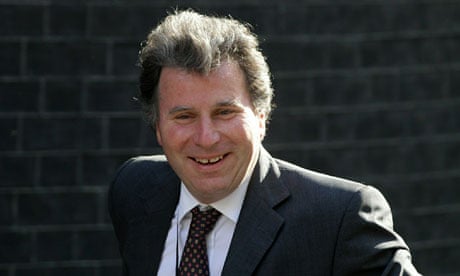Oliver Letwin, the minister for government policy, has admitted that a £500,000 "nudge unit" formed to apply the behavioural economics theory that people's habits can be improved without regulation is experimental and there is no concrete evidence that it will work.
Letwin told a committee of peers in the House of Lords that the unit, which is supposed to influence Whitehall policymaking, is not guaranteed to work, but that it was low cost with "almost zero risk" involved. The Cabinet Office, in which the group is based, confirmed that the nudge unit has seven government employees and costs £520,000 a year.
The unit, known formally as the Behavioural Insight Team, is run by David Halpern, a former adviser in Tony Blair's strategy unit who is paid £100,000 a year. Advice is being given by Richard Thaler, the Chicago professor generally recognised as popularising nudge theory – the idea that governments can design environments that make it easier for people to choose what is best for themselves and society.
Letwin told the Lords science committee, which is conducting an inquiry into behaviour change: "It is of course open to question whether any of this will have any effect whatsoever. I don't want to pretend that behavioural science is a sufficiently developed science to give us complete confidence or even sort of 95% confidence that any given technique will produce given results. It isn't that way. As a matter of fact the science of investigating regulation isn't sufficiently developed to give you that either. But I think it is extremely clear that it is pretty cost-free to do these things, pretty straight forward to do them so that if they don't produce any result we won't have lost much."
The group is overseen by a steering group chaired by Gus O'Donnell, the cabinet secretary. Halpern has a deputy director and five junior staff. The Cabinet Office said the £520,000 covered payroll, fixed overheads (desks, telephones, IT) and all other costs.
The disclosure follows a critical National Audit Office report on regulation that said the nudge unit had failed to convince a single Whitehall department to make use of its ideas so far. "The Cabinet Office told us that it has not been consulted by departments to date about possible alternatives to regulation at the assessment stage," it said.
Letwin told the committee that the team were working on five key projects: how to improve organ donations, stopping smoking, car labelling to make energy efficiency more conspicuous, food hygiene and a charitable project to improve donations. The unit is looking at a gift scheme in which consumers are offered the chance to donate their change to charity to make casual giving easier.
He said the common features of the schemes were that they involved "prompted choice" rather than regulating.
Last month Francis Maude, the Cabinet Office minister who works closely with Letwin, argued that government should be allowed to experiment and fail more than it does in order to attempt more ambitious projects.
He said: "I think if you have an excessive blame culture, where for every failure there has to be a scapegoat, every failure is deemed to be a culpable failure, then you have an environment, a culture, in which failure is not recognised, failure is hidden, and you become the prisoner of sunk costs. Good organisations cut their losses early, learn from the things that have been tried and haven't worked, and move on."
